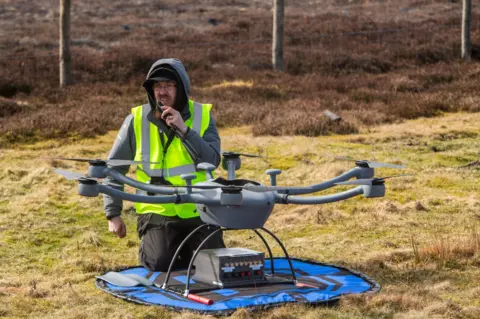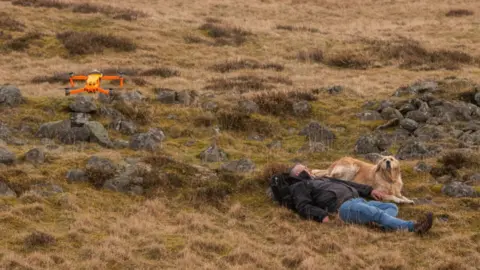Mobile phone signals can be spotty in the hilly areas of Scotland.
This can be a big problem if something goes wrong and you need help.
A trial taking place in Turfside in the Angus Hills aims to change that, testing the feasibility of using drones to create pop-up mobile phone networks.
Drones are already an important tool in mountain rescue operations.
The equipment can cover terrain much faster than traditional search teams and, thanks to its heat-detecting cameras, can also help with searches for injured or missing people.
At the moment, footage from the drones can only be seen by the pilot, but experts say that if a temporary network can be set up during rescue operations, images could be transmitted directly to base.
 Abatei Drone
Abatei DroneAlistair MacIntyre is a drone operator for Scottish Mountain Rescue Service.
“The search will continue, but if there is anything suspicious, that information will be sent immediately to the control vehicle or base so that more people can be involved in deciding whether or not we need to send in foot units,” he said.
The technology works by placing many 5G boxes strategically around the search area, which are small enough to be walked into or even deployed by drone.
The boxes then communicate with each other to create a private and secure 5G network.
“This box could send a signal to presumably all of the hill country around here, and then each of these boxes could relay the signal down to the next valley,” said Jet Connectivity’s James Thomas.
“The drones can continue to fly and form networks in the air, but they can’t just drop the boxes. [wider] network”.
 Abatei Drone
Abatei DroneIf an injured person is identified, the box can be placed near them to contact rescue teams, and if the search is ongoing, the technology can also be used to relay information from the team to a command base.
The system has also been tested at sea and could potentially be used in disaster relief scenarios if the network goes down.
In situations where every second counts, a 5G drone network can be set up in minutes.
Abertay University in Dundee assisted in testing the network’s security.
Senior lecturer Raeis Al Jobori told BBC Scotland News: “5G is a new technology and with any new technology there are challenges. It’s not enough to just provide the network, you need to provide a secure network.”
“A lot of information will be shared over this network, so we are testing it to ensure it is secure and only authorized people can use it.”



